By Ignacio Estrada Cepero, Independent Journalist.
Translated by: Eduardo Alemán
October 8 2012
English Translations of Cubans Writing From the Island
The companies that carry out these practices promote them demonstrating an alleged altruism. A gay couple, for example, comments on the web page of the American company Growing Generations: “We want to explain that he or she is a result of a combination of very generous acts: especially the pregnant mother and the egg donor, who are also allowed him or her to exist. This gesture of offering the gifts of one’s body to others, is very nice.”
Nonetheless, beyond the companies’ marketing, surrogacy itself is an abhorrent procedure of manipulation of the human being that resembles the times of the slave trade.
The process begins by “shopping” in a catalog. First, you choose the woman who will be the egg donor, and then you choose the surrogate mother. Various embryos, obtained by the fertilization of the eggs of the first woman and the sperm of one or both of the gay couple, will be inserted into the surrogate.
Then in vitro fertilization (IVF) is performed: The embryos are inserted into the surrogate mother. When the embryos fail to develop, a new cycle should be started. Either new embryos that were previously frozen are inserted, or a new in vitro fertilization should proceed. If the procedure is still unsuccessful, another surrogate mother should be found. The large number of embryos that die in this procedure can be seen.
Two different women are used so that the surrogate mother isn’t the baby’s biological mother, to avoid creating a bond. Still, many profound psychological studies are carried out to make sure the surrogate mother doesn’t get attached to the baby and want to keep it.
The IVF procedure can result in twins or triplets. When that many babies aren’t wanted, an “embryonic reduction” is performed, or rather, some of them are aborted. This is agreed upon in the signed contract.
Translated by: Michelle Eddy
August 6 2012
Havana – In recent days, the health authorities on the Island reported the presence of a cholera outbreak in the town of Manzanillo in the western province of Granma. Starting from that same day, July 2nd, the rumors have created fear and distrust about something that seems like it will become, yet again, another one of the many state secrets.
Since the appearance of this illness in Cuba, only the health body has drafted two very succinct notes that appeared in the official Granma daily newspaper and on TV. They mention that the outbreak is under strict control, but it is apparently not so, since they have detected new cases in other provinces in recent days.
What most catches my attention is the way in which the government tries to sidestep reality by making a call to intensify hygienic measures and water chlorination or treatment. As is expected, the response is immediate for each Cuban who hopes to not contract this sickness.
It would be reasonable to ask all the competent authorities on the Island if the call to sanitizing extends just to the private sector while the State continues without due control. To judge by the images, they continue selling refreshments in the streets from poorly cleaned movable tanks, offering consumers a very low-quality product.
The images show some of these tanks that remain at the park in La Ceiba, a suburb of Playa: the people crowd around and collect the liquid in bottles, these many times taken from the streets. The tap on these tanks is very close to the ground and so it is rare that a bottle is not placed on the ground prior to filling.
Who can guarantee that this refreshment, in most cases baptized with water from Lord knows where, is not also one of the means of infection? If we are really called to maximize the sanitary means on the Island, we will do it no matter whose business it is. Let us keep in mind that what is first is the preservation of the human species.
We speak sincerely and we do not leave the responsibility for our health only in our hands or those of our families; we call for every institution, organization, or ministry to take on the responsibility of hygiene in each local area. There is no potable water, chlorine, or detergent in many of them. Are they not also responsible then? If the situation returned to the same way described before, it would be worthwhile to ask the Health Ministry in Cuba and the competent authorities, “What hygiene are we talking about?”
Translated by: M. Ouellette
July 16 2012
Havana-Colored inflatables attract the attention of Cuban children as one of the most tempting offers of the present summer in the island. Teams install them in the most strategic places.
Many of the parents still believe that the operation of these devices is a work of the Cuban State, strictly for the recreation of our children. But what is actually true, is that these inflatables swell the list of new private businesses.
So far there only exist two parks of this type in the Cuban Capital. They are located in Habana Vieja and Playa.
According to Marita, an owner of one of the inflatables, theses inflatables are brought in from countries such as Panama, Ecuador, and Costa Rica, to give some examples. Marita adds that although their toys may appear in central state parks, they are Marita’s. For Marita to be able to run these installations, she generally must pay about 112.00 Cuban pesos a day.
The well-known Almendrares park, the ancient Futicuba in the corner of 41 and 58, the 26th Street Zoo, are some of the places that remain crowded by children waiting for a turn, for a short time, to enjoy what many call the Disney World of Cuba.
Despite the high taxes imposed on those who assume the responsibility of this creative work, that compensates for the deterioration of old children parks, the number of customers increases and some have begun to talk of extending their services to other provinces.
Today, smiling children can be seen enjoying the most beautiful diversions that only a little time back, were seen on the small screen — TV — at home.
Translated by: Tyrell Capers
July 16 2012
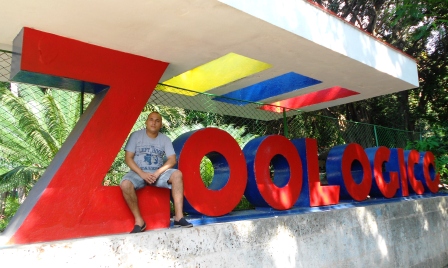 Havana – Once again the international media talks about the shipment of 146 animals from Namibia to Cuba. The act will fulfill the agreements signed by both governments a few moths ago.
Havana – Once again the international media talks about the shipment of 146 animals from Namibia to Cuba. The act will fulfill the agreements signed by both governments a few moths ago.
Just to cite some examples, there are elephants, black rhinos, lions, leopards, cheetahs and antelopes on the list of species. These animals will be removed of their natural habitat and will have as their final destination one of the two Zoos of Havana, God only knows.
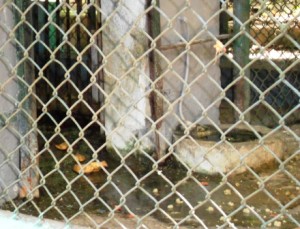 To this date, it has been said that the shipment of these 23 species of animals will be carried out by plane and will take place in October of this year. The shipment has been named “Noah’s Ark II.”
To this date, it has been said that the shipment of these 23 species of animals will be carried out by plane and will take place in October of this year. The shipment has been named “Noah’s Ark II.”
It is embarrassing for the Cuban people that these animals are being removed from their natural habitats to be put in captivity or, in the best case, to be taken to the new Zoo, which is located on the outskirts of the city and is currently undergoing restoration.
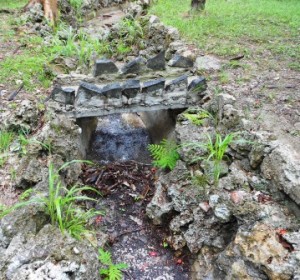 For years we have been deprived from seeing in our Zoos animals like those that soon will be landing in the capital. What is really sad for us and, calls all of those who may be concerned about this issue to reflect, is the treatment that these animals will receive on the island.
For years we have been deprived from seeing in our Zoos animals like those that soon will be landing in the capital. What is really sad for us and, calls all of those who may be concerned about this issue to reflect, is the treatment that these animals will receive on the island.
In recent years the parks for animal exhibitions throughout the entire country have suffered a high decay. In many of the cases, they lack the required diet to feed these animals, or when they have it, it is scarce. The sanitation of the facilities where the animals will live does not even have the slightest similarities to their natural habitat.
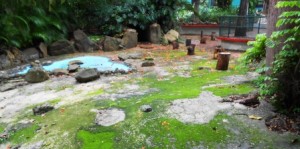 With the pictures that we are publishing today, taken at the Zoo on 26th Street in the Cuban capital, I make a warning call to all the international organizations for animal protection to reflect on the shipment of these animals to Havana.
With the pictures that we are publishing today, taken at the Zoo on 26th Street in the Cuban capital, I make a warning call to all the international organizations for animal protection to reflect on the shipment of these animals to Havana.
If the animals are sent as scheduled, they are at risk of living in the same conditions the animals we already have live under.
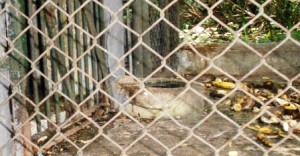 It is important to point out that the Namibians are the ones financing this shipment. The Namibian Ministry of Environment and Tourism, currently headed by Minister Netumbo Nandi Ndaitwah, must be warned. There is no doubt that prior to the signing of the agreements with Cuba, those in charge of the Havana Zoo did not show the images of the facilities that the animals will soon inhabit to the Namibians who with good will are giving this gift to the Cuban people.
It is important to point out that the Namibians are the ones financing this shipment. The Namibian Ministry of Environment and Tourism, currently headed by Minister Netumbo Nandi Ndaitwah, must be warned. There is no doubt that prior to the signing of the agreements with Cuba, those in charge of the Havana Zoo did not show the images of the facilities that the animals will soon inhabit to the Namibians who with good will are giving this gift to the Cuban people.
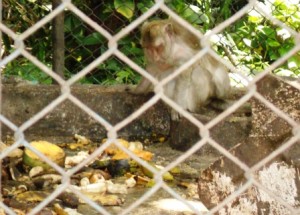 We must never allow that the new animals continue to be bruised from beatings to gain their obedience, as one of the lions in one of our pictures which shows scars from beatings on his face. Neither we must allow that the animals starve to death due to lack of food or that they contract diseases because of the lack of hygiene in the facilities they inhabit.
We must never allow that the new animals continue to be bruised from beatings to gain their obedience, as one of the lions in one of our pictures which shows scars from beatings on his face. Neither we must allow that the animals starve to death due to lack of food or that they contract diseases because of the lack of hygiene in the facilities they inhabit.
We want the animals in our country, no matter what habitat they live in, to become long lasting memories, instead of the sad images of lanky, hungry, thirsty, and ill animals.
Havana, Cuba more than being ready to receive new animals, must be ready to shout out loud to all people of goodwill: S. O. S. for the Zoo.
Translated by Chabeli
July 16 2012
Havana, June 26, 2012
TO THE NATIONAL ASSEMBLY OF THE POPULAR POWER OF THE REPUBLIC OF CUBA:
The Constitution of the Republic of Cuba in its article 63, states
All citizens have the right to direct complaints and petitions to the authorities and to receive the attention or pertinent responses in an adequate time-frame, according to the law.
And according to its letter and spirit, we the undersigned are directing ourselves to that maximum authority of the government of the nation with the following.
CITIZEN PETITION
According to postulates reflected in the Preamble of Principles of Jakarta about the application of international legislation of human rights in relation to sexual orientation and gender identity and which establishes that:
All human beings are born free and equal in dignity and rights, and every person has the right to the enjoyment of human rights, without any distinction as to race, color, sex, language, religion, opinion –political or of any other nature– national or social origin, economic status, birth or any other condition.
In all regions of the world people suffer violence, harassment, discrimination, exclusion, stigmatization and prejudices due to their sexual orientation or gender identity…
International human rights legislation imposes an absolute prohibition of discrimination in regard to the full enjoyment of all human rights…; that the respect of sexual rights, sexual orientation and gender identity are essential for the achievement of equality between men and women and that States should adopt all appropriate measures to eliminate prejudices and tactics based on the idea of the inferiority or superiority of either of the sexes…
Considering that in our country such ideas are still very far from being carried out in the bosom of Cuban society and are not duly reflected in current legislation, we believe it appropriate to SOLICIT:
The official acceptance and carrying out of the Jakarta Agreements.
That the national authorities carry out an ample investigation in all that is related to that negative event of our history named “Unidades Militares de Ayuda a la Producción” (UMAP: Military Units for Assistance to Production) and that their results be published in the national mass media.
That those responsible for those dreadful occurrences be subjected to judicial action for the repeated and massive violation of the human rights of countless numbers of Cuban citizens.
That the arbitrary use and application of the concept “dangerous state” of the current Penal Code against persons for the sole “crime” of their sexual orientation be explained publicly.
That the forced exile that numerous homosexual citizens were subjected to be opened to public debate.
That the violent deaths of some homosexuals on the streets or other locations be made clear.
Wendy Iriepa Diaz and Ignacio Estrada Cepero.
Translated by: Maria Montoto
July 2 2012
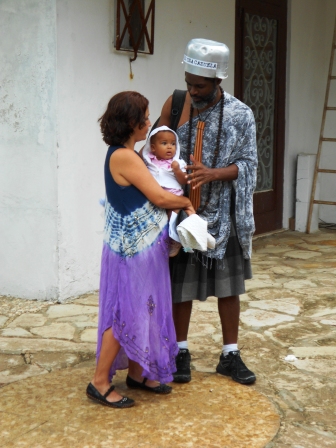 Havana–During three days, the first Festival Clic Independiente acerca de Tecnologia (Independent Click Festival about Technology) was held in Havana, Cuba. The festival was convened by the Blogger Academy of Cuba, Estado de SATS and Evento Blogger de España (EBE: Blogger Event of Spain).
Havana–During three days, the first Festival Clic Independiente acerca de Tecnologia (Independent Click Festival about Technology) was held in Havana, Cuba. The festival was convened by the Blogger Academy of Cuba, Estado de SATS and Evento Blogger de España (EBE: Blogger Event of Spain).
From June 21 to 23 the island would become a pioneer of an independent event of this magnitude financed from within the island by the efforts of its organizers. Forums of discussion, reports, subject panels, video debates and even a festival of child technology, were some of the conferences that caught the attention of academics, bloggers, Human Rights activists and members in general of the whole of civilian society. Those who defied, in order to attend each of the days, a rain which intermittently baptized the event which according to its organizers and participants will not be the first nor the last.
The foreign press accredited on the island attended each of the work sessions as did our brave independent journalists; there was no absence of those official paparazzi or bloggers who in an unscrupulous manner took photographs from rooftops, windows of adjacent apartments and from surroundings near the house of whoever participated in the event to which all were invited without distinction. These photographs were posted immediately on the Cuba Debate digital page, and others of official character in order to try to belittle what was taking place at such an important event of Technology.
As was already foreseen the event did not end with a final declaration and much less so did it attack those who refused the proposal of participating in this program, but what each of those present did agree to was the need of extending this event to other provinces, and the need for Cuba to connect with the World and that the World be connected to Cuba.
We await a new Click technology event which will give us new conferences in which we can learn about the use of new technologies and the social networks.
Translated by: Maria Montoto
June 25 2012
The levels of intimidation and repression of religious freedom on the island are the highest since 1980, according to a report by Christian Solidarity Worldwide, published in May 2012.
Their report documents a total of forty religious freedom violations in different regions of Cuba and compares them to those from previous years.
Benedict XVI’s visit to the island in March 2012 caused a strong display of security which prevented defenders of human rights and pro-democracy activists, many of them practicing Catholics, from attending the events of the papal visit. Because of this, hundreds of Cubans were jailed or imprisoned in their own houses through police harassment.
The report highlights the case of people like the Lady in White Caridad Caballers, who was regularly prevented from attending religious services, especially Sunday mass. Her family has been the victim of verbal and physical abuse and, in spite of relying on the support of religious leaders in their community, some family members have not been able to make their first communion.
The report illustrates the pressure that the government exercises over some religious groups to expel leaders who are not in agreement with the regime.
Many congregations belonging to the Western Baptist Convention have been threatened with church closures and the confiscation of vehicles and other goods.
They mention the case of pastor Omar Gude Pérez, who was condemned to six and a half years in prison and was freed in 2001. He is prevented from leaving the country in spite of the fact that the United States has granted political asylum to him, his wife, and his children.
Marriage of religious groups works to disclose the persecution of the Apostolic Movement, a network of churches constantly attacked by the authorities.
The report highlights an increase in physical aggression against pastors, as well as the brutality used. The pattern repeats in every case: victims have been leaders of small denominations that don’t have a support network and are found in isolated places.
Local security agents are responsible for the beatings, but since they have never been investigated, it is suspected that they rely on the backing of the government.
Last week, Cuban religious leaders gave testimony before the Congressional International Religious Freedom Caucus in the United States and members of the United States Commission on International Religious Freedom, and prepared a petition to include Cuba on the list of Countries of Particular Concern in relation to religious freedoms, according to the Capitol Hill Cubans blog.
Translated by: M. Ouellette
June 25 2012
May, Havana, Cuba.
FROM www.cubanet.org
The process of transition towards democracy, in authoritarian and totalitarian regimes, should be included as a subject within the Political Science field, because of the worldwide vast experiences gained from recent history, especially in European countries.
The fall of Communism in the Euro-Asian continent was undoubtedly one of the major events of world history, ending an ideological system that resulted in more than one hundred million victims.
The key elements that made the system collapse were: the stagnation of the socialist societies, the frustrated expectations of their citizens, nationalism, leaders of the dissidence like Lech Walesa and Vaclav Havel, the militaristic policies of Ronald Reagan and Margaret Thatcher, the advent of a Polish Pope, and especially the actions taken by Mikhail Gorbachev, a leader who, despite being in control of all the totalitarian powers, decided to create programs to promote freedom of the press and freedom of expression (Glasnost).
Gorbachev decentralized and restructured the stagnant Soviet economy (Perestroika); he also created competitive elections for new parliaments and leaders (Demokratizatsiya), and implemented new foreign policies that ended the Cold War.
The way in which Communism emerged in these European countries had a crucial influence on how they could get rid of it. Estonia, Czechoslovakia, Hungary, Poland, Georgia, Lithuania saw Communism as a foreign invasion that had brought poverty, deportations and violence. This is why these countries had a strong dissidence movement during the communist era.
In other countries like Russia, Ukraine, Belarus, and Serbia, there was some legitimacy due to poverty, illiteracy, lack of previous democracies, and lack of awareness as nations.
They ways in which the transition out of Communism took place in Europe can be divided into several groups. In the first group dissidents and nationalists were able to topple the recalcitrant Communist Party and form a government mainly composed of the opposition. As examples we can mention Vaclav Havel’s Czechoslovakia (where large student demonstrations took place, followed by a national strike), Sviad Gamsakhurdia’s Georgia, Askar Akaev’s Kyrgyzstán, and Vojislav Kostunica’s Yugoslavia.
In the second group, the communist parties were more flexible and willing to negotiate a transition, as in Poland and Lithuania.
In the third group, the communist leaders carried out the changes as their own initiatives and without being pressured. This was called “Revolution from Above”, and resulted in a moderate opposition movement, which negotiated with the moderates in the government. The most eloquent example was the Soviet Union.
In the fourth group, the former communist functionaries, who had been expelled from the Party’s high ranks, took advantage of the democratic movement to seize power through opportunism and revenge. A few examples to mention are Boris Yeltsin’s Russia, expelled in 1987 by Gorbachev; Franjo Tudjman’s Croatia, expelled in 1971 by Tito; and Ion Iliescu’s Romania, who was also expelled by Ceausescu in the 80s.
A fifth group characterized by second-level functionaries, as categorized within the regime’s nomenklatura, took advantage to raise reformist flags, either democratic or nationalist, and attack the government that they previously applauded and served. This is the case of Gyula Horn in Hungary and Slobodan Milosevic in Serbia.
The sixth group of countries is composed of the cases where political parties, due to major social pressures, were forced to fake a breaking away from Communism to survive. This was seen in Leonid Kravchuk’s Ukraine, Anatolijs Gorburnovs’ Latvia, and Ramiz Alia’s Albania.
For the seventh group, the transition was like a facade. The communist leaders became heads of state of independent nations, and kept in place the repressive structures and the planned economies, as in the case of Islam Karimov’s Uzbekistan, Vyacheslau Kebich’s Belarus, and Nursultan Nazarbaev’s Kazakhstan.
The eighth group is formed by Armenia, Azerbaijan and Nagorno-Karabakh, where the leaders ignored inter-ethnic conflicts for political interests.
Designed based on the same image, structure and political system from the countries of the former socialist camp, Cuba has not found yet its path to a political transition.
Its political and economic models remain the same. The fundamental freedoms continue to be shelved, awaiting social movements as drivers of change. The State, the government, the party, the judicial, legislative, military and repressive structures, continue to be a single entity.
The work of the internal opposition and the push from the diaspora have not been effective in creating the necessary objective and subjective conditions for change on the island.
The revolutionary strategies, presented as reforms and openings, as the correction of errors and negative tendencies, or as the modernization of the socialist model, have buried the aspirations in times of suitable circumstances.
The transition into democracy remains a pending subject for the largest of the Antilles.
June 25 2012
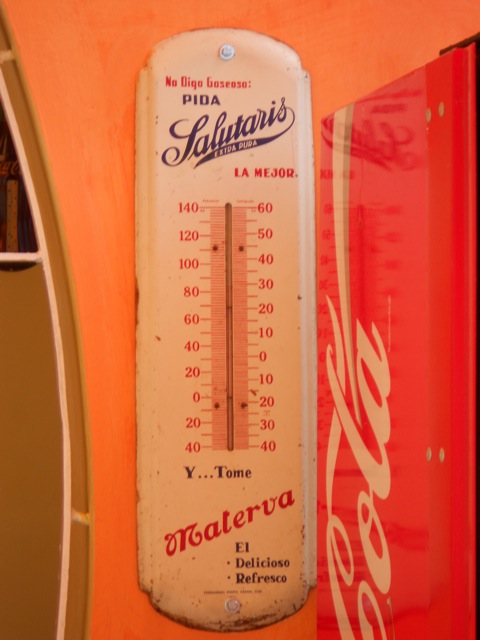 Havana, Cuba. Today I’d love to invite you for a stroll with my wife and I down Avenue 42 of the beach from 41 to 34. A spacious avenue with wide sidewalks and lawns with dense vegetation.
Havana, Cuba. Today I’d love to invite you for a stroll with my wife and I down Avenue 42 of the beach from 41 to 34. A spacious avenue with wide sidewalks and lawns with dense vegetation.
Imagine with us that it’s one of those afternoons in which we say our goodnights to the sun when, before finishing our short walk, we come upon a salmon-colored house. A dwelling decorated by its proprietors with the purpose of opening up its front porch and taking advantage of the space in its garden for a snack bar, a business they had been cooking up for a good long time.
The brand-new trade has had had several names but the one that’s made the owners most enthusiastic is “Today As Yesterday”, recalling the need to create commercial products with the quality that our grandparents once enjoyed.
What’s certain is that according to one of the owners, when he went to register the business with the authorities of the National Tax Administration Office (ONAT), the name was changed, because the authorities did not like the one he’d submit. After a long debate amongst the family members, they decided on the new name “Enter”.
 I’d like to reflect on what’s wrong with calling a snack bar “Today As Yesterday”. Although the Cuban government permits the creation of private businesses, it maintains a control over them, control that apparently could even question the name that we give them.
I’d like to reflect on what’s wrong with calling a snack bar “Today As Yesterday”. Although the Cuban government permits the creation of private businesses, it maintains a control over them, control that apparently could even question the name that we give them.
I’d like to share with you the reason the owners of the new business initially decided to call it “Today As Yesterday”, a name that gives tribute to a time of economic prosperity.
The images we include in this story are some of the pieces that were used to decorate this snack bar, the same ones that remind people of their grandparents…who can separate these signs from our national identity? Who can demonstrate to me how these signs harm anyone? The danger can only be perceived by the minds of those who try to deprive new generations from knowing the splendor of times prior to the processes that took place in 1959.
I wish I dared to stand before this new business and shout in my loudest voice that if things could really be “Today As Yesterday”, it would be a whole new day in Cuba.
Translated by: Rafael Gómez
May 28 2012
Havana Cuba, Thursday, February 16, 2012.
General Report of the Cuban League Against AIDS on Human Rights violations to the community of Lesbians, Gays,Bisexuals and Transgenders.
It has been five decades from that fatal triumph led by people wearing olive green clothes coming down from the mountains, and proclaiming a society of equality for all, without discrimination by race, religion, political and sexual orientations.
Not many years went on before the first exclusions of all Cubans who had a sexual behavior — defined by the emerging government as embarrassing and as a way of life that endangered the socialist morality of the Cuban nation — started to be seen in workplaces, educational and state institutions.
Our people lived through years of confinement, forced labor camps, repudiation acts, and as if that was not enough, in many cases, some were stoned and forced to go into exile, separating them from their families and friends.
Cuban history contains the anecdotes and the suffering of Reinaldo Arena, Virgilio P., Lezama, and those others whose names remain forgotten and whose bodies are found in the waters between the Florida straits and the Cuban shores.
Fifty years later history repeats itself, and the violations of human rights continue targeting the LGBT community in Cuba. The rulers have been changing the ways in which they commit these violations, but when you start analyzing the situation that the LGBT community faces, you see that it is the same.
The lack of public spaces, freedom of expression, freedom of association, the right to have a relationship and marry in equality of rights, and the right to decide the appropriate moment to tell their families about their sexual orientation are some of the violations that the LGBT community in Cuba is constantly facing.
While the State institutions like the National Center for Sexual Education (CENESEX) run by Mrs. Mariela Castro Espín, daughter of the current ruler of the nation, speak to the world about the certain openings that guarantee human rights for the LGBT community, the reality of the island is completely different; one that she would not hesitate to silence because of her fear of losing the large amounts of money collected for ghost projects that only respond to the interests of the Cuban State and not to those of the LGBT Cuban community.
There are daily reports on the island of the arrests of LGBT people, accompanied by heavy fines, deportations for homosexuals that are not from Havana, extortion and blackmailing by the police authorities or the law enforcement officers who want to benefit from the suffering of those who fall into their hands. There are also beatings, temporary detentions, searches in public places, among other actions of arbitrary nature.
There is evidence, from 2010, of layoffs based on the employee’s sexual orientation, layoffs of members of the LGBT community because they are following the government’s political ideology or simply because they are friends with someone who was a LGBT rights activist.
Violence caused the death of six homosexuals who died under an unknown situation. The death of a young transvestite from negligence and inattention in a police station was denounced, as well as the layoff of a transsexual woman, Wendy Iriepa Díaz, for marrying a human rights activist, and the arrests of homosexuals in public places and the removal of homosexual from the streets for supposedly harassing tourists.
We must continue denouncing the unjust prison sentences, from two to four years and the forced labor fields, for homosexuals because they are wandering around at night in the streets of Cuba, or drinking alcohol, or have decided no to work for the Cuba State because their families support them from abroad.
“Cuba is a country where the authorities are not prepared to confront radical changes like same sex marriage, adoption, and coexistence.” While the government gives this explanations, we Cubans wonder: how did they come up with this criteria? When we go out into the street, people smile at us and compliment us, not because of our sexual orientation, but because of what we stand for.
The true guilty people for the constant violations that the Cuban LGBT community faces are the State and its institutions, the real homophobic and discriminatory weapons. There is no power or people more discriminatory in this nation than its rulers.
The rise of male prostitution, within the community of men who have sex with other men, has resulted in 8 out of 10 of those infected with HIV being men, which is the largest number ever reached in the history of this community.
Despite totalitarianism, despite the fierce power of the State, the Cuban LGBT community now rises and emerges from the ashes, like a phoenix, showing a beautiful plumage and the colors of our unique flag demanding and recovering all the places usurped by the State power and the lies.
Today we demand our rights, we want to walk as a nation, as an independent community, as a community that advocates for the rights of all and not the rights of the minority in power.
The reason for our existence is to fight for the civil, political, economic and cultural rights of the LGBT community in Cuba. Our voice today demands to be heard and we want shout out that we exist and we are working to find a solution and looking forward to the future.
Ignacio Estrada Cepero
Executive Director
Cuban League Against AIDS
Posted originally on: February 17, 2012
The Cuban Catholic Church’s press media have tried in recent days various efforts to clean up a bit the image of one who has already come to be known as The Cardinal of Ignominy or The Cardinal of Indignity.
It isn’t that I want to take up against the purple and much less against the Cuban clergy and the body of the Church founded by Peter. But the fact that the Church and its media want to excuse Cardinal Jaime Lucas Ortega Alamino in front of the world is something embarrassing and we should denounce it in front of as many media as are at the service of what we call a press without a gag and without ties.
For those of us who in one way or another have been tied to the Cuban Church and who feel ourselves to be faithful believers in her doctrine, it is difficult to imagine in the midst of the 21st century the image of a church complicit with those who stripped her of her belongings and made her feel sterile until the beginning of the 1980’s when they allowed her to make the journey of the Pilgrim Cross.
The words of no press media of the Church can, nor will ever be able, to erase the message of the Cardinal when he visited in the United States: a speech paraphrased from some leader of a fruitless revolution. A presentation in which the words that were on his lips were charged with hate and lies against thirteen Cubans who, days before the visit of His Holiness (Pope Benedict XVI) to Cuba, occupied the Church of La Caridad (Virgin of Charity) in Central Havana. I repeat again, and would not tire of testifying, that the speech given was taken from the desk of the ideological head of the Central Committee of the Communist Party of Cuba.
The press media at the service of the Church, instead of being occupied with so much collaboration and servitude to a man who hides even his own background as does Jaime Lucas Ortega Alamino, should give explanations as to why, in the last few years, the entry of foreign priests and nuns has been limited on behalf of the Cuban authorities, should give an accounting of how many temples in Cuba are in bad physical shape, and what is the exact number of new religious buildings constructed after the year 1959.
These are things of which we can talk, and not about an ill-achieved civil society set up by religious leaders full of rumors, and who fill their stomachs at tables as if they were those of presidents, forgetting the reality and the famine of thousands of Cuban homes.
If the Cuban Church wishes to defend itself from possible conspiracies, that could only exist in the minds of persons incapable of assuming the responsibility of their actions and words, it is best that it buy itself a dog that barks, bites, and scares away others.
Cardinal, I am one of those people who doesn’t hide my expression of what I feel, I love my Virgin of Charity, I love the Faith, but it would be impossible for me to love you as a person and much less to follow your teachings. On various occasions I have written about the Cuban Church and, in many of these texts, I have not doubted in saying what to me are truths that many do not know.
The moment in which we are living is a moment of radical changes; now let us not speak of dialogue, let us speak of changing all of that which must be changed. Perhaps now the Church would like to speak of dialogue, after sitting at the table of dictators and having received some crumbs. We as a people and a nation do not want any dialogue with the Church, and much less with the authorities in power. We want that each and every one carry on their shoulders what, during five decades, they have caused to each Cuban; we want that each one be seated in the bench of the accused, whomever they may be and whatever rank they may have.
Civil Society in Cuba is all of us and not just a few. Civil Society is that which walks and rises today in the resurgence of a new nation that approaches to contemplate a new dawn already near.
The Cuban Church would be different if it gave way to new voices charged with juvenile energy, or people who are willing to revolutionize a church subject to the bribes of a corrupt and stagnant government. Let us recall that the abuse of children on behalf of clergy and the religious jumps to the forefront in any commentary and shakes the foundation of the Church the whole world over and Cuba is not the rule of the exception.
Has anyone asked themselves: Why haven’t similar cases been published in Cuba? Perchance the Cuban clergy doesn’t have the same weaknesses as those of other priests and religious persons? There is much to continue talking about and many topics that tarnish the role of the Church and its leaders and implicate it in a dark plot with a government that is a detractor of Christian faith. One should go on to ask: Might this not be one of the reasons for which the Cuban Church is subject to comply with what the Cuban government wants? There are many more questions to ask and, in reference to this last, I urge others to write and uncover these hidden truths.
As far as a possible conspiracy to destroy the Cardinal, I am convinced that it doesn’t exist, what I can assure you is that very soon we will erase that smile from the face of the Porcelain Doll: the name by which the Cuban Cardinal is known in the Lesbian, Gay, Bisexual and Transgender (LGBT) community who also form part of the body of the Cuban Church.
It is impossible for the press media of the Church to speak about these things so openly, but whosoever of us has the power of the word, let us do so from our podiums each time that it is possible.
Translated by: Maria Montoto
May 31 2012
I was surprised listening to the words of Mariela Castro, in the United States, calling herself a dissident. I picture her as a kingbird on a clothesline, waiting to see where the food is thrown out. Then, she comes down and eats.
I categorize her words as imprecise. And her speech, I would dare to assure you, was put together with guidance from Dr. Alberto Roque, who usually travels with her in many of her trips as her manservant. In case that you are unaware, he is one of the people who even advises her, sometimes, on what to wear.
We would have to ask Mrs. Mariela Castro the reason why she is calling herself a dissident. I don’t understand what things she disagrees with, and even less, what she is not satisfied with because she has never had enough courage to complain about anything before the Cuban press, or before her followers on the island.
Her visit will trigger a lot of debate at the international level, and it is already marked by strong discrepancies among Democrats and Republicans. Now I ask: who is the crazy person that gave a visa to this representative of the most long-lasting dictatorship in Latin America? Whose idea was it to let into the United States someone who is trying to hide the reality that the Cuban LGBT (lesbian, gay, bisexual, and transsexual) community lives? Now, I would dare to say from any podium that I don’t know who we are fighting against, if even dictators and their puppets find refuge in the United States of America.
Is not Mrs. Mariela Castro constantly denouncing the the very government that granted her the visa for supposedly financing independent LGBT groups to sabotage her work? Now I know for sure that whoever let this person into the supposed home of democracy has completely lost their marbles. Or is it, perhaps, that Mr. Obama decided to offer a visa to someone who says that, if she lived in the United States, she would vote for him. Someone who, when in Cuba, joins with her group of buffoons in charging that the LGBT community receives USAID funds from the American government? We have a number of questions, but now is not the time.
What had to be avoided happened. The Cuban government sent those who are promoting a new image of the regime taken on by Raul Castro. It sent those who want to promote a type of dialogue for which many of us are not prepared. We are not willing to share our leadership in our story with those who have sunk us in hatred, misery and in the disintegration of our motherland values and of the Cuban family as the hardcore of our society, for more than five long decades.
It would be impossible to sustain a dialogue with those who have punished us and have forced us to coexist with people who insist on being deaf to the demands of the Cuban people. The LGBT community does not want a dialogue anyway, neither does it feel it is represented by someone who is trying to bribe the world with phrases and smiles from the worst play ever staged, titled, The Faggoty Cuban State, under the artistic direction of someone who wants a career in drama because she wasn’t able to finish her doctorate.
We have to ask what is the supposed Human Rights of the LGBT community in Cuba, which Marielita, daddy’s girl, who confesses to being heterosexual and who now says she is a dissident, identifies with and is committed to. Is she pretending to call the one or two night clubs, in Havana, with shows and techno music for the LGBT community, Human Rights?
Are we calling the few days dedicated to the struggle against homophobia and the street parades, whose number of participants is decreasing every year, Human Rights?
Isn’t police persecution at LGBT gathering places, detentions, and fines to the members of this community for wandering around at night or for visiting areas designated for tourists only some of the things she also feels identified with?
If we start asking all of these questions, it would never end, and the majority of them would not have an answer, as usual. I am one of those who thinks that we have time to see and judge, but what a pain that after we’ve committed our time, we wake up in the middle of something we’ve never imagined.
Does anyone know the exact number of workers who have resigned working with the person who today is claiming herself to be in defense of Human Rights, and the reasons why?
Does anyone know how many ex-workers from the CENESEX live outside of Cuba today? Can anyone tell me what happened to the medical history files of the person who is today Daniela Pulido, a beautiful woman transsexual who after deserting from a meeting in Canada a few years ago, lives today in the United States? Can anyone tell me why after she ran away from the official authorities she has not been able to go back and visit her loved ones?
Oh, Humanity, we are taking steps without knowing the level of complicity we are getting into. Let’s stop for an instant and think if our actions are the right ones and whether we are actually honoring ourselves in whatever position we have.
This is my small contribution. Today I know I am writing from home, but tomorrow I don’t know where I will be writing from. And in case that you stopped reading me, just look far out into the distance and repeat with me: damn those who continue being complicit with silence, it will end whether, they want it to or not.
Oh, Saint Damned Mariela, who claims herself the patroness of Homosexuals, quickly allow all the freedoms which you serve on your father’s table, as the most delicious delicacies, and if this story does not have a happy ending I charge you to be responsible for the consequences.
Now this is getting good, Mariela Castro dissident, and I continue to be an Opponent.
June 6 2012
Havana, Cuba– During the entire month of May, the Cuban government in conjunction with the official entity Centro Nacional de Educación Sexual (CENESEX, National Center of Sexual Education) has developed a group of activities with the purpose of curtailing homophobia in Cuba and to demonstrate its commitment to walk alongside the LGBT, Lesbians, Gays, Bisexuals and Transgenders on the island.
Fruitless and insufficient efforts that lack credibility in contrast to the true reality that this community lives daily. The official efforts that are led by Mariela Castro Espín have only had, until the moment, the achievement of approving in 2008 genital reconstructions. These add up, to date, to a total of 16 surgical intentions headed by a group of Belgian specialists. It is valid to point out that said operations have been seen to be halted after the abrupt departure of Wendy Iriepa Díaz from CENESEX.
One would have to ask the LGBT, “which is the most homophobic sector in Cuba?” If we analyze the reality this community faces in spite of uncertain apertures and inefficient campaigns, we would find a society in which the existent homophobia may be called Governmental or Official Homophobia.
I realize we are a “macho” nation by identity, but I do not fail to realize who the true culprit is behind what is faced by a community that, for more than five decades, has lived the slap on the back by those who sent it to forced labor camps, into exile, stigmatized it, marginalized it and now, changing its tactic, sends it to prison for the supposed crime of posing a social danger.
It is time to speak of things as they are. “Whoever is afraid should buy a dog,” says one of the phrases repeated daily on the island. I can not adapt it to me because I have no fear of expressing what I feel and think. Even less so do I have to buy a dog because I have on my side all of the existent social networks which, unlike dogs, can not be poisoned or decapitated. It is a weapon that constantly barks and is at the defense of humanity.
Let us call homophobia in Cuba Governmental Homophobia. Is it by any chance not they who are culpable for all that we have lived? Are they not the ones who pursue us daily and take us into police units for roaming the Cuban streets? Is this not the same government that submerges us into a state of lacking rights and usurps each of our spaces? If we wanted to keep asking, I would ask Mariela Castro Espín several things.
One of the questions we could ask this feminine personage, who today makes an effort to demonstrate to the world her leadership, why does she make such an effort in taking all the credit for the work with the LGBT community in Cuba when it was her mother who initiated this gesture before the Cuban government? Why does she try to erase the role developed by that Belgian sexologist who lived for years in Cuba? What is her true intention in representing the Cuban LGBT community? What gives her a sense of identification with our community, perchance is she equal to us or some member of her family a member of our organization? And one of those questions I would not tire of repeating to her is, “Does there exist some relation between those five Cubans sanctioned in the United States — for spying — and the LGBT community?” When I ask this last question, it is due to her use of placards demanding their liberty on behalf of the LGBT community.
I am a member of that LGBT community and have never participated in demanding liberty for any of them (the aforementioned group of five); I believe that before we can achieve liberty for those whom the Cuban government says are innocent, we must achieve liberty for each one of those homosexuals taken to prison and we have to achieve a public apology for what we have lived through for years.
Now let us talk about Homophobia with the truth and, seated in the bench for the accused, the true culprits.
Translated by: Maria Montoto
May 28 2012
Havana, Cuba- Danilo Maldonado (El Sexto, or “The Sixth”), a well-known young graffiti artist in Cuba, exhibited his work this past Friday the 25th in the afternoon at the alternative space of Estado de SATS (State of SATS).
It is the second time that this artist showcases his creation, the samples running the gamut from already known templates to new plastic works. The activity included the participation of friends and followers of the work of the one who signs his name — El Sexto — in the most unexpected places.
One of the featured pieces was an altar with a white background, which illuminated with candles the Human Rights activists that in the last few years have revived in spite its demise, a new awakening in countless groups that champion respect for Human Rights within Cuba.
Amongst the people honored in this sort of altar aromatized by incense were: the leader of the Ladies in White, Laura Pollan Toledo, who passed away under unknown conditions in a Havana hospital after suffering a respiratory infection; Juan Wilfredo Soto Garcia (The Student) who died in Santa Clara as a consequence of a beating fostered by agents of the police; and the (hunger) strikers Orlando Zapata Tamayo and William Villar Mendoza. On the altar there also appeared, within a frame in the superior portion, tiny images of the endless number of victims that will someday form part of the martyrology of a badly managed Revolution.
Danilo Maldonado thanked each of those present and especially thanked those who, in one way or another, made possible the exhibition of his work in the venue of the Biennial of Havana in spite of the fact that he received no invitation to expose his work in this oficial edition. The expo was animated by singer-songwriter Ciro who is part of the well known group Porno para Ricardo.
Translated by: Maria Montoto
May 28 2012